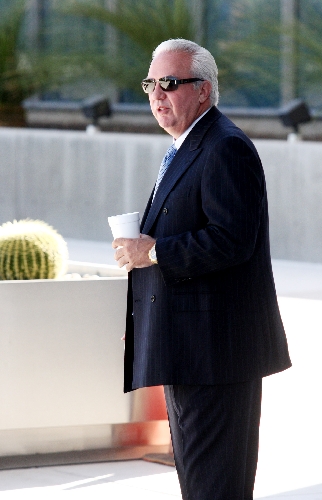‘Crime doesn’t pay’ philosophy works for ex-strip club owner
It took some time, but U.S. District Judge Philip Pro finally found a way to get Rick Rizzolo to stop smirking and snapping his gum in court.
Rizzolo's "Crime Doesn't Pay" tour ended abruptly on Wednesday when Pro sent the truculent former Crazy Horse Too owner back to prison for violating the conditions of his parole and for refusing to make a good-faith effort to pay his many debts. If that's not enough to pop his Double Bubble, there's more.
Our crowded jails aren't full of parole violators. Simple infractions such as a dirty urine test rarely send a felon back behind bars. For that, a fellow usually has to work at it. Rizzolo has done just that by pressing his "crime doesn't pay" philosophy.
Back in June 2006, Rizzolo avoided the likelihood of a lengthy prison sentence when he arranged to plead guilty to a single tax charge and settle a racketeering investigation into the felonious activity at his Industrial Road club. Despite its Sleazer's Palace facade, the Crazy Horse Too generated a mountain of cash for Rizzolo and his mobbed-up managers and henchmen, most of whom he persuaded to also plead guilty in a global settlement that netted the boss a year and a day in jail and $17 million in fines and restitution.
A key component of the criminal case was the September 2001 beating of Kirk Henry, a Kansas tourist who visited the club and had the audacity to complain about his bar bill. In the parking lot, one of Rizzolo's goons broke Henry's neck and made him a quadriplegic.
As part of the criminal settlement, Rizzolo agreed to pay Henry $10 million from the sale of the Crazy Horse Too to end a pending litigation filed on the Henry family's behalf in Clark County District Court by former federal Strike Force prosecutors Donald Campbell and Stan Hunterton.
When the economy tanked, so did the value of the Crazy Horse Too. Last month, the club once worth an estimated $30 million sold for $3 million. Not that Rizzolo intended to hand over the money to Henry, who with interest is now owed $14.67 million.
That's because Rizzolo and his attorneys have been practicing their best "crime doesn't pay" routine, hanging their refusal to make good on his debts until the club was sold despite the fact he spent lavishly, gambled as a casino high roller, held a multimillion-dollar interest in a Philadelphia topless club development, and had millions more stashed away under his ex-wife Lisa's name in supposedly secret Cook Islands bank accounts.
Meanwhile, Henry sat at home in his electric wheelchair under the care of his wife, Amy. Out of sight, but not out of the minds of Campbell and Hunterton.
The attorneys started tracking Rizzolo's lifestyle, then established the presence of the offshore bank accounts in the deposition of Lisa Rizzolo. She essentially admitted shilling for her ex-husband and failing to declare the foreign bank deposits on her federal income tax returns.
The revelation hasn't gone unnoticed by the Criminal Investigation division of the IRS, which had an agent in court this past week. I'm not sure where implicating the mother of your children in potential felonies ranks on the standup guy meter, but I'm guessing it's not very high.
On Wednesday, Pro grew tired of Rizzolo's gum-snapping wiseguy routine.
After listening to defense attorney Dominic Gentile's lecture on the "mixed signals" that have been sent in the case, Pro clarified any confusion by ruling Rizzolo had violated multiple provisions of his supervised release and sent him back to prison for nine months.
Pro extended Rizzolo's parole two years, banned him from gambling, demanded the transfer of approximately $300,000 from the sale of that Philadelphia topless cabaret project, and ordered the return to U.S. soil of offshore bank accounts containing millions.
I don't know if Rizzolo swallowed his gum, but I'd like to think Pro's ruling at least wiped the smirk from his kisser.
Given all that, you'd figure Rizzolo had finally learned his lesson, right?
Wrong. He still believes crime doesn't pay unless it's forced to.
A day before Pro restored order in the federal case, Gentile filed a motion in the state litigation claiming that his client still didn't owe the Henrys their money despite the recent $3 million sale of the property.
Sure, the Crazy Horse Too property sold, but the "business" has not. Gentile wrote, "Indeed, the sale of 'the Crazy Horse Too business' within the contemplation of the settlement agreement in this case and the Court's Order of May 18, 2007, has still yet to occur.
"Thus the Defendant respectfully submits that -- contrary to the contention of the Plaintiffs -- he is still not in fact in breach of the settlement agreement, and the Plaintiffs are therefore still not entitled to have that voluntary settlement agreement reduced to an involuntary judgment."
If that doesn't make you spit out your gum, nothing will.
John L. Smith's column appears Sunday, Tuesday, Wednesdaty and Friday. Email him at smith@reviewjournal.com or call (702) 383-0295. He also blogs at lvrj.com/blogs/Smith.

















